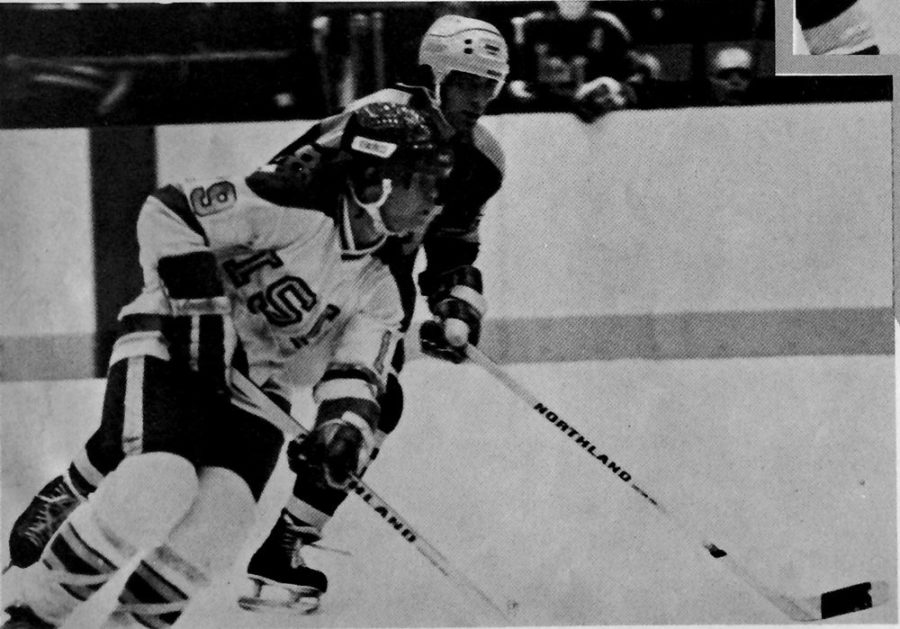Not quite a miracle: When Cyclone Hockey players tried out for the 1980 Olympic team
February 7, 2018
It started with a letter in the mail.
Shaun Elder, a forward for Cyclone Hockey from 1976-79, couldn’t believe what it said. The letter was from the Amateur Hockey Association of the United States.
He’d been invited to try out for the 1980 Olympic men’s hockey team, a shock to Elder given Iowa State’s “club” team status.
“As a hockey program, we weren’t anywhere on anybody’s radar,” Elder said. “I had a good career at Iowa State, but to be invited to Olympic camp was overwhelming at first.”
Elder believed that the invite had to be the work of then-head coach Alan Murdoch, who had a relationship with the Olympic team’s now legendary head coach Herb Brooks. He went to show the letter to his roommate, who read through the letter and noticed two words in particular: “Open tryout.”
While Elder had been specially invited, the tryout was technically open to the public.
Despite knowing the odds of making the team were minuscule, even for someone who’d been invited like Elder, a few additional members of the Cyclone hockey team accompanied their teammate to the tryout in Edina, Minnesota.
Murdoch, who also tagged along, watched from the top of the bleachers at Braemar Ice Arena where the tryout was held. He didn’t have much to say beforehand that the players didn’t already know, but he nonetheless offered some advice.
“I just taught them to be fearless and that you could be anything that you want to be,” Murdoch said. “I said, ‘hey, you know these are going to be pretty good players,’ but they were fearless. They thought, ‘why not?’”
Elder estimated that roughly 100 people showed up at the camp, most of them NCAA Division I players. Although the Iowa State players knew that Brooks pretty much had his roster set at that point, they nonetheless tried just in case there was a “miracle” in store for them.
During the camp, players were relentlessly drilled and eventually divided into teams of 20 for games if they were deemed worthy by the coaching staff. Sitting with Coach Murdoch in the stands, Elder remembers his only real interaction with Brooks.
“Which one is Shaun Elder?” Brooks asked.
Elder raised his hand.
“Go get your equipment. We’re going to go play.”
Not only did Elder get to play, but he played well. With future gold medalists like Mark Pavelich, Bob Suter and Mark Johnson also taking part in the games, Elder remembers scoring multiple goals during the scrimmage portion of the tryout.
This was due in large part, Elder said, to the fact that he was prepared conditioning-wise for the camp. Because of Murdoch’s relationship with Brooks, the two frequently talked with one another and incorporated each other’s methods into their coaching.
For both coaches, a core belief was being the better-conditioned team in the final period, which meant that Brooks was going to push the players in his camp to the brink with drills and conditioning.
“I’m thinking to myself, ‘Jesus Christ, are we ever going to see a freaking puck this weekend?’” Elder said. “But there was method to [Brooks’] madness. He wanted the best conditioned athletes.”
Elder and his teammates certainly fit that bill. Oftentimes, the team under Murdoch, would be on the ice anywhere from five to seven times a week. The team was on the ice so much that Elder even considered quitting the team during Thanksgiving break of his freshman year.
He didn’t, however, after getting some harsh reinforcement from his father. Just like it had throughout his career, which included a 50-goal senior season, the conditioning and work was paying off for Elder by allowing him to show out on a big stage.
Unfortunately, Elder’s nice weekend still wasn’t enough to land him a spot on the team. His teammates had been cut prior to the games, and Elder found out that he wouldn’t be advancing further via a posted list that didn’t include his name.
This wasn’t disappointing to Elder. Going into the experience with almost no expectations, the fact that he’d made it as far as he did was like playing with house money. With that in mind, he set out to have as much fun with it as he could.
“I’m actually very surprised I even got to play a game,” Elder said. “I had a ball. I mean if nothing else, I could always say, as little as it might’ve been, I got to try out for the 1980 Olympic team.”
Even though Elder nor his teammates made the Olympic team, the memory is a fond one for the players when looking back on their hockey careers. Not only that, but according to Murdoch, the performance of his players reflected very well on Iowa State and helped with the program’s legitimacy.
In the time following the tryout, after the Olympic team had won the gold medal and completed the Miracle on Ice, Elder’s Iowa State teammate, Bob Johnson, decided to look on the bright side of not making the team.
He offered Elder some perspective on the whole experience while the two were together in Ames.
“You know what, we had a hand in winning that gold medal,” Johnson said.
“What do you mean?” Elder asked puzzled.
“Well if they had picked us,” Johnson said. “They would’ve never won it.”







